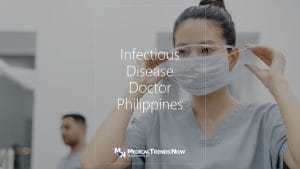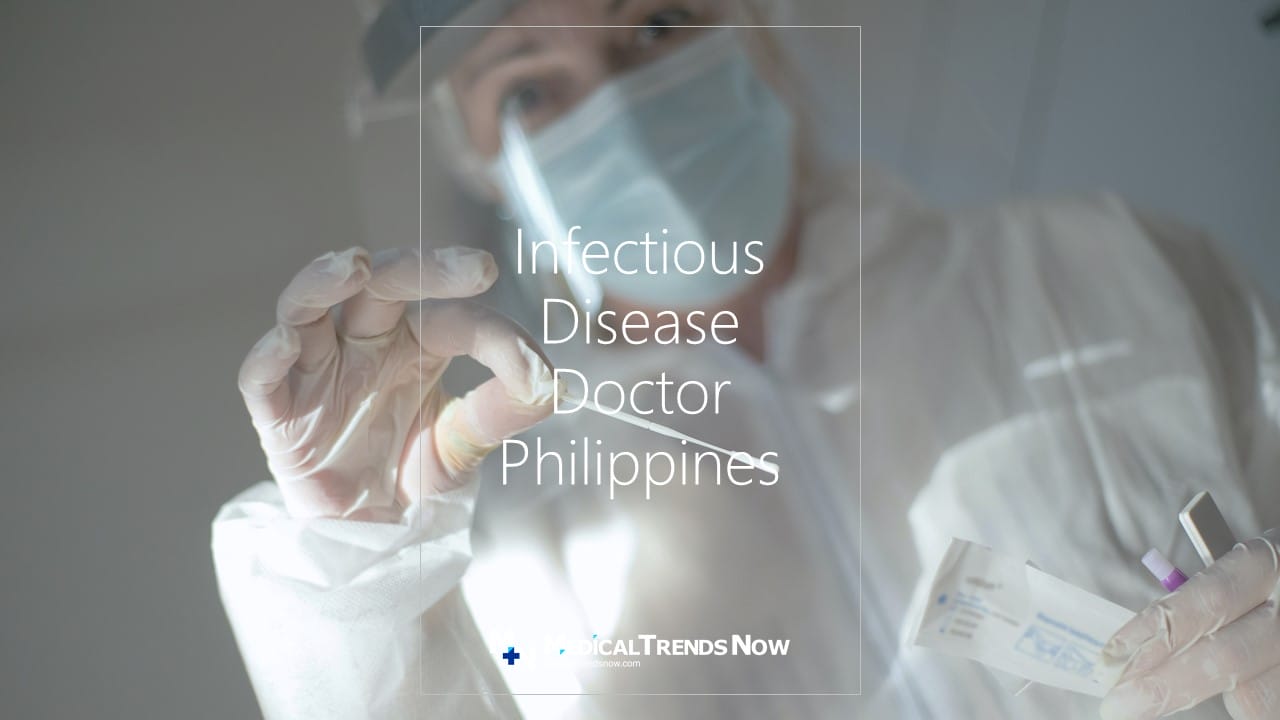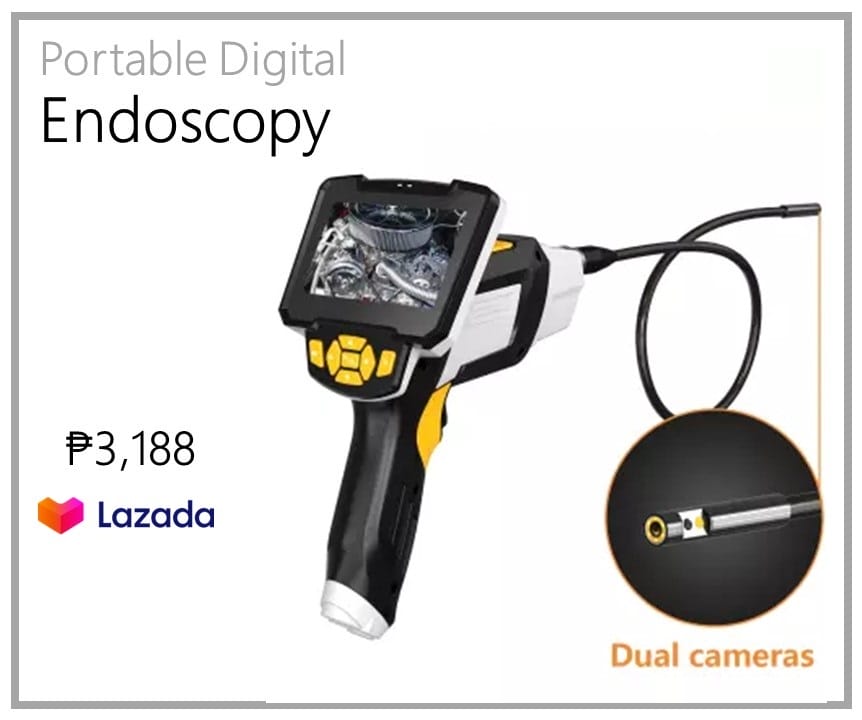Table of Contents
Choosing the correct Infectiology physician or infectious disease doctor in the Philippines can be challenging. Several factors to consider, including location, experience, and specialty. If you are looking for an expert in a specific field, it is vital to research which ID doctors have the most experience with that disease.
This article will expound on the Infectiology causes, treatments, common diseases, doctors, hospitals, technologies, and where to find the correct physician for Filipino patients.
What is Infectiology?
Infectiology is the study of infectious diseases, their causes, and treatments. Infectious diseases can be severe, life-threatening illnesses that can affect any part of the body, including the brain and heart.
The cause of infectious diseases to a patient is a variety of viruses, bacteria, fungi, and parasites.
There are many different types of infectious diseases, but some common ones include colds and flu, hepatitis A and B, meningitis, and sepsis.
Infectious disease doctors diagnose and treat infections using various methods, including medication, surgery, and radiation therapy.
What is Infectious Disease?
Infectious diseases are illnesses caused by bacteria, viruses, or parasites. They can be severe and even life-threatening.
Infectious diseases can spread through contact with saliva, blood, mucus, or other body fluids that contain the disease agent. Common infectious diseases include colds, the flu, Lyme disease, tuberculosis (TB), and hepatitis C.
It is crucial to choose an infectious disease doctor in the Philippines who has enough experience treating these conditions.
An ID doctor who is knowledgeable about the latest treatments and prevention methods for these diseases will help you get the best possible care.
What Does Infectious Disease Doctor Do?
An infectious disease physician (also known as an ID Doctor, an Infectiology Doctor, Infectiologist) is a healthcare professional specializing in diagnosing and treating contagious diseases. They work in various settings, including hospitals, clinics, and private practices.
Infectious disease doctors typically have a doctorate degree in medical science or another relevant field.
They may also have experience working with patients who have infections and knowledge of the latest treatments and strategies for preventing infections.
Why See an Infectiology Doctor?
When it comes to getting sick, most people will go to their regular physician. However, if you are feeling very ill and have no idea what is wrong, it is essential to see an infectious disease doctor. There are a few reasons why this is the case:
1) Infectious diseases can be challenging to diagnose without proper testing. A doctor who specializes in infectious diseases will be better equipped to make a diagnosis and may be able to identify the specific type of infection you have.
2) Infectious diseases can lead to more severe health problems if not treated properly. If you have an ongoing infection without proper treatment, your immune system may not be able to fight off other infections as quickly, which could lead
How to Choose the Right Infectious Disease Doctor in the Philippines?
When looking for an infectious disease doctor in the Philippines, it is vital to consider a few factors.
First and foremost, it is crucial to find a doctor who has experience treating infectious diseases.
Additionally, it is critical to look for a doctor who has access to the latest medical technology and treatments.
Finally, it is essential to consider the doctor’s price range.
The Location of the Infectious Disease Doctor in the Philippines
When choosing an infectious disease doctor in the Philippines, it is vital to consider the location.
Doctors who work in major cities, such as Manila, Makati, Clark, Davao, Muntinlupa, Alabang, Quezon City, Laguna, Cavite, Paranaque, Pasay, Mandaluyong, and Cebu, are likely to have more experience treating common infections than doctors who work in rural areas.
It is also essential to consider the doctor’s qualifications. Board-certified infectious disease doctors are generally more experienced and qualified than those who are not board certified.
Consider the Medical Staff and Nurses Work Experience
When looking for an infectious disease doctor in the Philippines, it is vital to consider the medical staff and nurses’ work experience.
Many doctors who work in infectious disease clinics have years of experience working with patients with contagious diseases.
However, it is also essential to consider whether the doctor has experience working with patients who are HIV positive or have other chronic diseases.
Some clinics may also employ specialists in other areas of medicine, such as pediatrics or internal medicine, which can give you more options when seeking care.
Consider the Services of the Infectious Disease Doctor
When you are looking for an Infectious Disease Doctor in the Philippines, it is crucial to consider their services.
An Infectious Disease Doctor may provide some services that include diagnosing and treating infections, giving guidance on immunization schedules, and helping patients understand their disease symptoms.
It is also essential to consider which Infectious Disease Doctor you would like to work with based on your specific needs.
Consider the Experience and Training of the Infectious Disease Doctor
When considering who to see for an infectious disease diagnosis or treatment in the Philippines, it is vital to consider the experience and training of the doctor.
Many doctors in the Philippines have completed a medical residency program in infectious diseases, but this is not always the case.
Some doctors may have acquired experience working at a hospital or clinic specializing in infectious diseases, while others may have learned about infections through clinical experience.
Regardless of how experienced a doctor is, it is crucial to ensure that they have the proper training to treat your specific disease.
Compare Prices and Services of Infectious Disease Doctors
There are many infectious disease doctors in the Philippines.
It can be challenging to decide which doctor to choose for your needs. You may want to compare the prices and services of the different doctors before making a decision.
Some may charge more for their services, while others offer less expensive rates. It is crucial to compare rates and services to find the differences.
Consider the Facilities Used and Hours of Operation
When choosing an infectious disease doctor in the Philippines, it is essential to consider the medical facilities and hours of operation.
Some doctors may have more extensive facilities that can handle more patients simultaneously, while others may have shorter hours of operation that may not be convenient for you.
It is also important to research the doctor’s experience and reputation to find a physician to provide quality care.
Decide According to Your Budget
When looking for an infectious disease doctor in the Philippines, it is crucial to consider your budget and needs.
There are a variety of doctors who can treat different contagious diseases, so it is essential to do your research and find someone who will best suit your needs.
Some of the common treatments by an infectious disease doctor in the Philippines include colds, flu, pneumonia, and tuberculosis. It is also essential to keep in mind that not all doctors are equally skilled at treating each type of infection.
So, if you have a specific infection that you want to seek treatment for, it is vital to find a doctor specializing in that area. In addition, some doctors may charge more based on the severity of the illness or based on
Check the Insurance Coverage of the Infectious Disease Doctor
When it comes to finding an infectious disease doctor in the Philippines, it is vital to check the doctor’s insurance coverage.
Some doctors may only accept government-provided health insurance, while others accept private health insurance or cash payments.
It is crucial to find a doctor who takes your specific type of health insurance to ensure that you can avail of the proper treatment should you become infected with a disease.
Review the Feedback From Other Patients
Since many people are looking for an Infectious Disease Doctor in the Philippines, it is vital to have a good resource.
One way to find the right doctor is by reading reviews. However, it is crucial to be aware that not all reviews are accurate.
It is also important to consider the patient’s individual needs when reviewing a doctor.
Check the Education and Qualification of the Infectious Disease Doctor
When choosing the right infectious disease doctor in the Philippines, it is crucial to ensure that the doctor has both an education and qualification in this field.
Many doctors who are not qualified to treat infectious diseases may try to offer treatments anyway, which can be dangerous and even deadly.
It is also essential to ensure that the doctor you choose has experience working in your specific region or country.
By doing some research, you can find a qualified infectious disease doctor who will be able to provide you with quality care.
Check the Social Media Feedback
When looking to find an infectious disease doctor in the Philippines, it is essential to consider feedback from social media.
Some physicians may have a good reputation online, but if there are no reviews from patients, it may be challenging to know if they are reputable.
It is also essential to research the specific infectious diseases that a doctor specializes in. If possible, visit their office or clinic and ask questions about their practice.
Check the Infectious Disease Doctor’s Reputation in the Community
It is always essential to choose an infectious disease doctor with a good reputation in the community.
This way, you can be sure that the doctor will be able to provide quality care for you and your loved ones.
Some ways to check the doctor’s reputation include looking online or talking to friends who have used the doctor before.
Clinics, Medical Centers, Hospitals, and Infectious Disease Doctors in the Philippines
Here are some of the hospitals that you can find online. Just click the name of the hospitals to view their rates, services, and schedule availability.
- Philippine Children’s Medical Center
- St. Luke’s Medical Center
- San Lazaro Hospital
- Philippine General Hospital
- Cardinal Santos Medical Center
- Makati Medical Center
- Mary Mediatrix Medical Center
- De Los Santos Medical Center
- VRP Medical Center
- The Medical City
- Chong Hua Hospital
- Calamba Medical Center
- Caduceus Medica Infectious Disease Clinic
- Davao Doctors Hospital
- De La Salle University Medical Center
- University of Santo Tomas Hospital
- Manila Doctors Hospital
- Asian Hospital and Medical Center
Organizations of Infectious Disease in the Philippines
Here are some of the organizations and associations supporting the advancement of Infectiology in the Philippines. You can find many resources about infectious diseases, various services, and rates on their websites.
- Philippine Society for Microbiology and Infectious Diseases
- Philippine Genome Center (PGC)
- Pediatric Infectious Disease Society of the Philippines (PIDSP)
- Philippine Medical Association
- Tropical Disease Foundation
Questions that You Should Ask When You Visit an Infectious Disease Doctor
When you are looking for an infectious disease doctor in the Philippines, you will likely want to ask a few questions.
Here are some questions to ask when visiting an infectious disease doctor:
- What is your experience treating infectious diseases?
- What types of infections do you specialize in?
- How many patients have you treated with this particular infection in the past?
- What is your approach to treatment?
- Are there any specific medications or treatments that you use that are particularly effective against this type of infection?
What are the latest Technologies and Diagnostics Used By an Infectious Disease Doctor?
Infectious diseases are a leading cause of death globally, and the Philippines is no exception. According to the World Health Organization, infectious diseases are responsible for over one-third of deaths in the Philippines.
There is no one silver bullet when it comes to preventing or treating infectious diseases, but many effective technologies can help doctors diagnose and treat these conditions. One such technology is molecular diagnostics, which can identify infections quickly and accurately. Molecular diagnostics can also help doctors determine the best course of treatment for an individual patient.
Other technologies that can help treat infectious diseases include antibiotics and vaccines. Antibiotics can kill bacteria that cause infections, while vaccines help protect people from infections by specific viruses.
Some effective treatments for infectious diseases in the Philippines include antiviral drugs, antibiotics, and vaccines. Antiviral drugs can help treat infections caused by viruses, such as chickenpox and measles. Antibiotics can help treat infections caused by bacteria, such as tuberculosis and pneumonia. Vaccines can protect people from infections by specific viruses, such as polio.
When it comes to diagnosing and treating infectious diseases, there are several different technologies and diagnostic methods that can be used. Some of the most common ways include blood tests, x-rays, RT-PCR tests, and ultrasounds.
In addition, infectious disease doctors may also use antibiotics and other medications to treat patients.
What are the Common Types of Treatments
There are many treatments for infectious diseases, depending on the illness and the person’s age, health condition, and other factors.
Treatment may include medication, surgery, or a combination of both.
What to Expect When Seeing an Infectious Disease Doctor in the Philippines?
When you are looking for an infectious disease doctor in the Philippines, you should expect to undergo a series of tests.
These tests may include a blood test to look for signs of infection, a chest x-ray to look for pneumonia, and a stool test to look for parasites.
In addition, your doctor may recommend antibiotics if you are showing signs of infection.
Where Can I Find an Infectious Disease Physician? Doctor Near Me
Finding an infectious disease doctor in the Philippines can be easy since most hospitals have an ID physician.
There are many options, but some places to look include doctors near your area or searching for doctors by specialty.
It is vital to find an ID physician experienced in treating infectious diseases, as not all doctors can do so.
How To Become An Infectiology Doctor – Education And Training
There is no one-size-fits-all answer to this question, as the best way to become an infectious disease doctor may vary depending on your location and experience. However, many infectious disease doctors in the Philippines have a bachelor’s degree in medical science or a related field and undergo specialized training before practice.
Some of the most common courses that infectious disease doctors in the Philippines may take include:
- Epidemiology
- Virology
- Microbiology
- Mycology
How Do ID Specialists Work With Other Physicians?
When a patient is diagnosed with an infectious disease, it is crucial to find the right doctor to treat them.
There are many infectious disease specialists in the Philippines, but how do they work with other physicians?
Typically, infectious disease specialists work closely with other physicians to diagnose and treat their patients.
They may also work together to create a treatment plan tailored specifically for the patient.
Additionally, infectious disease specialists may be able to provide guidance on preventing infection in the first place.
Infectious Disease Subspecialties
Infectious disease specialists are available in different subspecialties, such as pediatric infectious diseases, sexually transmitted infections, tuberculosis, and malaria.
It is important to find a doctor who specializes in the specific type of infectious disease you are experiencing so that you can get the best care possible.
Here are some of the subspecialties available in the Philippines.
General internal medicine
Internal medicine is a medical specialty that deals with the diagnosis and treatment of diseases and conditions within the body.
This includes diagnoses made by examination, tests, and procedures such as X-rays and scans.
Internal medicine doctors also often treat diseases of the heart, lungs, kidneys, liver, and intestines.
Medical microbiology/virology
Infectious diseases are a significant health concern in many parts of the world, and medical microbiology and virology are essential disciplines in diagnosing and treating these illnesses.
Medical microbiology and virology are two of the many medical professions that deal with the study of infectious diseases.
Microbiology is the study of microorganisms, including bacteria, viruses, and fungi. Virology is the study of viruses and their hosts.
Tropical medicine
Tropical medicine is treating patients who are affected by tropical diseases.
These diseases are typically found in countries worldwide that have a warm climate, such as the Philippines.
Tropical medicine is a specialized field that requires extensive training and experience to treat patients effectively.
HIV/AIDS
Infectious disease doctors are experts in diagnosing and treating infections, including HIV and AIDS.
If you are living with HIV or AIDS, it is vital to find a doctor who has the most experience in treating these conditions. There are a few things you can do to help choose the right doctor for you:
First, talk to your friends and family members who have experience with the disease. They may be able to give you recommendations for doctors in your area.
Second, research which infectious diseases doctors have a wealth of knowledge and are best to treat HIV and AIDS.
You can use online resources like the National Library of Medicine’s PubMed database or search for specific keywords like “HIV/Aids” or “AIDS treatment.
Hepatitis
Hepatitis is a viral infection that can damage the liver. The common cause is a hepatitis A virus, spread through contact with contaminated water, food, or surfaces.
The hepatitis B virus can also cause liver damage. Symptoms of hepatitis include fever, fatigue, nausea, and vomiting.
If left untreated, hepatitis can lead to liver failure and death.
Malaria
Malaria is a severe and potentially deadly disease caused by parasites that live in the blood of infected people.
It can be fatal in up to 5% of cases and is most common in areas of the world where there is a high prevalence of malaria mosquitoes.
There are several types of malaria, all of which require different treatments.
The most common type is falciparum malaria, which affects the red blood cells and can be fatal if not treated promptly with antibiotics.
Public Health
Public health is the practice of protecting people from disease and injury.
Public health professionals work to prevent disease outbreaks, monitor the health of populations, and provide public education and outreach about healthy lifestyles.
They also work to improve the quality of life by addressing environmental factors that can lead to illness.
Pediatric Infectious Disease
Pediatric infectious disease refers to diseases that affect children, including infections caused by bacteria, viruses, and fungi.
Children are more likely to get these infections because their immune systems are still developing, and they are more likely to spread the infection to other people.
Some of the most common pediatric infectious diseases include pneumonia, bronchitis, and diarrhea. Parents must know about these diseases and how to protect their children from them to lead healthy lives.
Tuberculosis
Tuberculosis is a severe lung infection caused by the bacterium Mycobacterium tuberculosis.
Tuberculosis can be deadly if not treated quickly, and it is the leading cause of death from a respiratory illness in the world.
There are three types of tuberculosis: pulmonary, miliary (in the lymph nodes), and reticulotropic (in other organs).
Each type has a different treatment approach, and patients with pulmonary tuberculosis may require intensive care.
Transplant Infectious Disease
The transplant infectious disease (TID) is a severe complication that can occur after a transplant.
The cause of TID is via the transfer of an infection from the donor to the recipient. The most common infections that can lead to TID are hepatitis C and HIV.
After a transplant, the risk of developing TID is highest if the donor has hepatitis C or HIV.
Treatment for both diseases includes antiviral drugs and, in some cases, liver transplants.
If you consider a transplant, it is important to talk with your doctor about your risks and options for preventing TID.
Common Infectious Diseases in the Philippines
The Philippines is a tropical country with a warm climate that makes it an ideal place to live and work. However, the Philippines is also home to various infectious diseases that can be harmful if not treated properly. Some of the most common infectious diseases in the Philippines include:
Lung infections, including pneumonia and bronchitis, are common in the Philippines due to the country’s humid climate. These infections can be deadly if not treated quickly and effectively.
Malaria is also a significant concern in the Philippines, as it is endemic throughout much of Southeast Asia. Symptoms of malaria include fever, chills, sweating, and weakness. Malaria can lead to serious health complications if left untreated, including death.
There are several contagious diseases that can be contracted in the Philippines. Some of the more common ones include:
Chickenpox
Chickenpox is a viral infection that typically affects children and young adults. Varicella zoster virus (VZV) is the leading cause of Chickenpox.
Chickenpox is highly contagious and can be spread from person to person through contact with droplets from an infected person’s mouth, nose, or eyes.
Symptoms of chickenpox include fever, rash, and headache. The rash usually appears on the face, chest, and back and may last for several days.
Recovery typically takes about two weeks.
Prevention of chickenpox includes avoiding close contact with people who are sick with chickenpox and getting vaccinated against chickenpox.
Common cold
A common cold is a virus that can cause a cold, flu-like symptoms.
The leading cause is rhinovirus, which spreads through the air.
The most common cold symptoms are fever, sore throat, and headache.
Diphtheria
Diphtheria is an infectious disease that can be fatal if not treated quickly.
Bacterium Corynebacterium diphtheria is the leading cause of Diphtheria, spreading through coughing and sneezing.
Symptoms of diphtheria include fever, a sore throat, and difficulty breathing.
If left untreated, diphtheria can lead to death. In the Philippines, it is most commonly contracted through contact with respiratory secretions from someone who has the disease.
Treatment typically includes antibiotics and rest.
E. coli
E. coli is a type of bacterium that can cause food poisoning.
It spreads through contaminated water or food, but it can also spread through contact with hands, surfaces, or contaminated objects with the bacteria. E. coli infection can lead to diarrhea, vomiting, and abdominal pain.
In severe cases, it can lead to kidney failure and even death.
If you think you may have contracted E. coli infection, consult your doctor immediately for treatment options.
Giardiasis
Giardiasis is an intestinal infection caused by the protozoan Giardia lamblia.
The parasite enters the body through the mouth or nose and can cause severe diarrhea, abdominal pain, and weight loss.
Treatment typically includes antibiotics to cure the infection and prevent complications.
Giardiasis is most common inland, air, or sea travelers who have visited areas where the parasite is endemic, such as parts of Africa and Asia.
HIV/AIDS
HIV AIDS is a serious, life-threatening virus that can lead to full-blown AIDS if not treated.
There are several types of HIV AIDS, but the most common is called HIV-1. HIV-1 attacks the body’s immune system, making it difficult for the body to fight other infections.
As a result, HIV-1 can spread quickly from person to person and cause serious health problems, including AIDS.
If you are concerned about your health or that of someone you love and want to know more about HIV AIDS, talk to your doctor.
There are many resources available online and in libraries and medical centers.
Infectious mononucleosis
Mononucleosis is a viral infection that can cause fever, fatigue, and sore throat.
It spreads through contact with saliva or mucus from an infected person.
The virus can also spread through close contact with infected animals, such as camels and horses.
There is no specific treatment for mononucleosis, but it can be treated with rest, medication, and over-the-counter cold remedies.
Influenza (flu)
Influenza (Flu) is a highly contagious respiratory illness caused by the influenza virus. It can cause severe acute respiratory syndrome (SARS), a deadly disease.
There are many types of Influenza, and each year there is a new strain that can cause widespread illness in people of all ages.
The best way to prevent flu is to get vaccinated against it each year.
The Infectious Disease and COVID-19
The Philippines has been hit hard by the deadly Covid-19 virus. There is a high demand for infectious disease doctors in the country as patients seek treatment for the virus.
To choose the right infectious disease doctor in the Philippines, it is essential to understand the virus and its symptoms.
Patients should also consult with a healthcare professional before traveling to the Philippines to ensure they are prepared for any potential complications from Covid-19.
Who is the Most Famous Infectious Disease Doctor in the World?
Dr. Anthony Fauci, an infectious disease doctor is the most famous infectious disease doctor in the world.
Anthony Fauci, a world-renowned infectious disease doctor and immunologist is the Director of the National Institute of Allergy and Infectious Diseases (NIAID), one of the National Institutes of Health. He is involved in many groundbreaking medical breakthroughs, including his work on identifying and treating AIDS. Dr. Fauci is also a member of the U.S. National Academy of Sciences and a Fellow of the American Association for the Advancement of Science and The Royal Society.
Dr. Fauci has advised seven Presidents on HIV/AIDS and many other domestic and global health issues. He was one of the principal architects of the President’s Emergency Plan for AIDS Relief (PEPFAR), a program that has saved millions of lives throughout the developing world. Source: NIAID
Conclusion: Infectious Disease Doctor in the Philippines
When it comes to choosing an infectious disease doctor in the Philippines, there are a few things that you should consider.
First and foremost, you should ensure that the doctor you choose is experienced in treating infectious diseases.
Additionally, it would help if you also looked for a doctor who has extensive knowledge of the local area’s health care system.
Finally, it is essential to find a doctor who is easy to communicate with and understands your needs.
Sources
- Centers for Disease Control and Prevention
- Centers for Disease Control and Prevention
- Philippine Society for Microbiology and Infectious Diseases
- Philippine Genome Center (PGC)
- Bio Med Central
- Research Institute for Tropical Medicine
- The Lancet
- Philippine Society for Microbiology and Infectious Diseases
- Department of Health
- State of Rhode Island, Dept of Health
- National Foundation for Infectious Diseases
- Baylor College of Medicine, Dept of Molecular Virology and Microbiology
- Health Hub
- Cleveland Clinic
- Science Direct
- University of Utah Health Hospitals and Clinics
- University of Cambridge
- PLOS Neglected Tropical Diseases
- Red Cross














